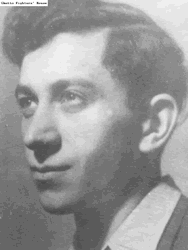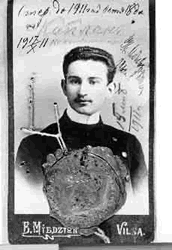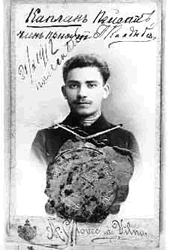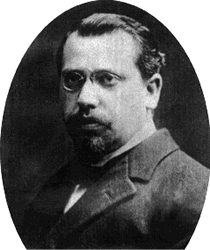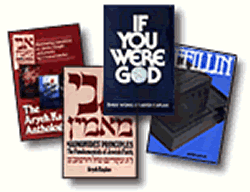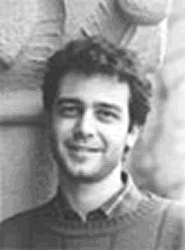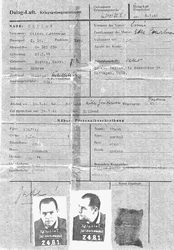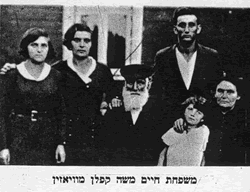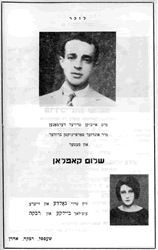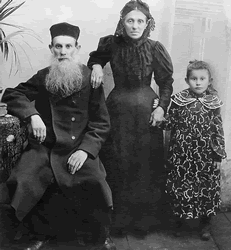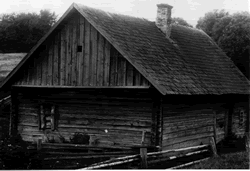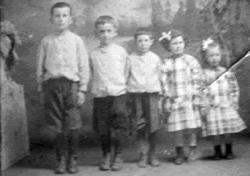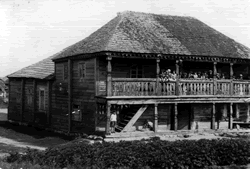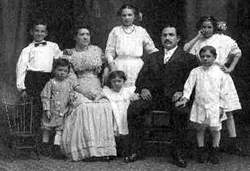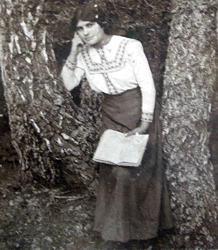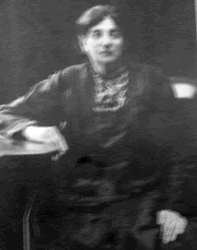1913- September 1942
Josef Kaplan, a leader of Ha - Shomer ha - Tsa'ir and a founder of the Jewish Fighting Organization (ZOB) in the Warsaw ghetto.
Josef Kaplan was born in Kalisz in 1913. He was on the main leadership of Ha - Shomer ha - Tsa'ir in Warsaw, having been a movement member from an early age and had been head of its local chapter in Kalisz. In 1933 he went to an agricultural training commune and was waiting to immigrate to Palestine, but was sent instead to organize the activities of Ha - Shomer ha - Tsa'ir in the Rovno area. His movement responsibilities required him to travel throughout Poland, and he organized seminars, summer camps and training communes. With the outbreak of WWII he went to Vilnius (Vilna) to gather together a group of movement members and accompany them across the border to Lithuania. The movement called him back to Warsaw in February 1940, requiring him to give up his dream of immigrating to the Land of Israel and building his life on a kibbutz (collective settlement). In Warsaw, Kaplan was an outstanding activist. He lectured in seminars, organized activities for the movement and was an organizer for illegal emigration via Slovakia and the various Zionist pioneering organizations such as He - Chaluts. He worked hard to maintain connections with the more remote branches of the movement. Thanks to a railroad pass he was able to obtain, he traveled several times to Czestochowa, each time taking a number of movement members with him.
(1881-1983)regarded as one of the twentieth century's foremost philosophers and interpreters of Jewish thought. Born in Lithuania, Kaplan received rabbinic ordination from the Jewish Theological Seminary. He served as a congregational rabbi and as a member of the faculty of JTS. He is the creator, and for generations the guiding spirit, of the Reconstructionist philosophy of Judaism.Through his writings and teachings, he has helped to mold the structure of many American Jewish institutions, providing the American Jewish consciousness with new vocabulary and a series of challenging value concepts. There are countless institutions that we take for granted which we created by Mordechai Kaplan, including the synagogue center and the Bat Mitzvah.Kaplan's magnum opus, Judaism as a Civilization, is an original and thought provoking contribution toward creating a comprehensive program for creative Jewish life, and a modern classic of Jewish literature.
Jewish Theological Seminary of America
Rabbi Aryeh Kaplan's meteoric rise as one of the most effective, persuasive, scholarly and prolific exponents of Judaism in the English language came to an abrupt end on January 28, 1983, with his sudden death at the age of 48.
Rabbi Kaplan was a multi-faceted, uniquely creative and talented author. In the course of a writing career spanning only 12 years, Aryeh Kaplan became known to Jewish youth and adult readers for such books as Waters of Eden-The Mystery of the Mikvah: Sabbath-Day of Eternity: G-d, Man and Tefillin; The Light Beyond; The Handbook of Jewish Thought; and The Living Torah, a clear, contemporary translation of the Five Books of Moses.
Rabbi Kaplan was born in New York City and was educated in the Torah Voda'as and Mir Yeshivos in Brooklyn. After years of study at Jerusalem's Mir yeshiva, he was ordained by some of Israel' foremost rabbinic authorities. He also earned a Master's degree in physics and was listed in Who's Who in Physics in the United States.
Aryeh Kaplan's unusual warmth, sincerity and total dedication to Torah were an inspiration to the thousands he reached personally. The process of bringing Torah to the masses, Rabbi Kaplan revealed much of which was previously hidden. His mind contained libraries of books, waiting to be put into writing.
It was the will of the Lord that so much be revealed and no more.
Call 212-613-8226 to Order
Mr. Kaplan was from Boston and had entered the Army after his third year at MIT. He later transferred into the 8th Air Force in 1943 and trained in Texas as a B17 navigator. While a prisoner at Stalag Luft I, he lost 1/3 of his body weight, going from 200 lbs. to 135 lbs. He died in June 1977http://home.att.net/~merkki/kaplanmilton.htm
#kap-10:
Abraham Kaplan and Sara Rebecca Bradebord Kaplan (Born in Nemunaitis approximately 1854) with Anna Kaplan (Born in Nemunaitis in 1900) circa 1905
submitted by Ian Singer islandparrot25@gmail.com
#kap-11
Baths in Lithuania
#kap-12:
Harris Family from Berdechev Russia ( related to the Kaplans)
submitted by Ian Singer islandparrot25@gmail.com
#kap-13:
The shul my Kaplan family prayed in Lithuania
submitted by Ian Singer islandparrot25@gmail.com
#kap-15
unknown photo of person in my family (Kaplan or Bradebord )
submitted by Ian Singer islandparrot25@gmail.com
#kap-16
unknown photo of person in my family (Kaplan or Bradebord )
submitted by Ian Singer islandparrot25@gmail.com
Avraham Eliyau Kaplan
Born in 1854 in Rakov, died in 1899 in Kaidan. Avraham Eliyau of Rakov
studied in Volozhin and Minsk. After the death of his first wife, who
was the daughter of the rabbi of Rakov, He moved to Kaidan with Wenia,
where he became the husband of the daughter of Zalman Troyev. He had a
unique explanation of Talmuid studies and the studies of Rambam. He wrote
many essays, but most of them burned during a big fire in Kaedan. Some
of it survived, amongst them a book of poems that he wrote that was typical
of the poetry of those days. In the foreword, he wrote with excitement
about the revival of the Hebrew language. He died at a young age in Kaidan,
and his son who was born after his death was named for him.
.Kaplan, Avraham Eliyau son of Avraham Eliyau
Born in Kaidan in 1890 a few months after his father who was born in Rakov
died. His mother was the granddaughter of Rabbi Shimon Troyev. He was
raised in the house of his grandfather, Zalman Troyev, the Rabbi of Kaidan.
He studied four years in the Talaz Yeshiva and later studied in Kelm,
Lithuania in the Musar Yeshiva. From there he transferred to the Slobodka
Yeshiva where he studied for eight years. There he became very close with
the spiritual head of the Yeshivah, Rabbi Nettali Zvi Finkel who was known
as the Sabbah (grandpa). He was deeply influenced by him. He was also
very educated in Hebrew literature and in secular studies. Had a literary
approach to his religious studies. He also wrote poems and music. During
the days of World War I he settled in Talaz, and locked himself in a room,
studying. After the war he became involved in the civil service. He took
part in the meetings of the Jewish communities and meetings of the committees
of the Jews of Lithuania. Was amongst the founders of the religious youth
organization Tzeirei Israel (the Youth of Israel) and became its spiritual
leader. In the middle of 1919, he accepted the invitation of the rabbinical
school of Berlin, which was founded by Azrael Hildsheimer, and became
a teacher of the Talmud there, and established there the style of the
Lithuanian Yeshiva. In the monthly newsletter he wrote answers to questions
about Jewish studies. He planned to write a new interpretation of the
Babylonian Talmud that had to do with a more scientific interpretation.
He started writing the introduction, a very sophisticated piece of research
that was printed in Yeshurun, but while he was writing it, he died at
the age of 34. Despite his short life, he still left behind a rich literary
legacy.
From: Danny Kaplan <dannykaplan@gl.com>
Date: Wed, Apr 11, 2018 at 12:20 PM
Subject: Kaplan from Minsk
Hi,
I was wondering if you can help me. Im trying to research the Kaplan family. Here is what I know.
My Grandfather Moshe Kaplan (1925-1983) studied in Grodno Yeshiva before joining the Mir Yeshiva in Shanghai later moving to Toronto.
His Father was Abram Kaplan married to aides Kaplan a Jeweler in the Minsk Area. Abraham’s fathers name was Moshe Kaplan.
Moshe had a Brother in Grodno also, named Gershon but never made it to Mir.
Any help or direction would be very helpful.
Thanks
Danny
